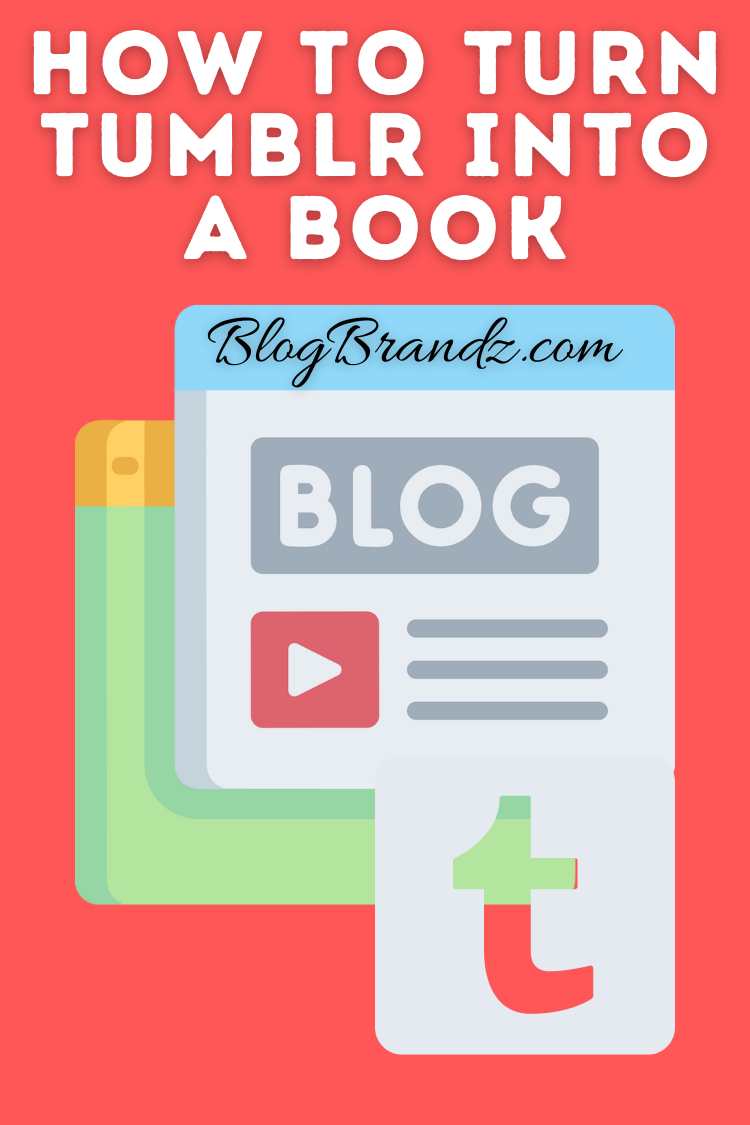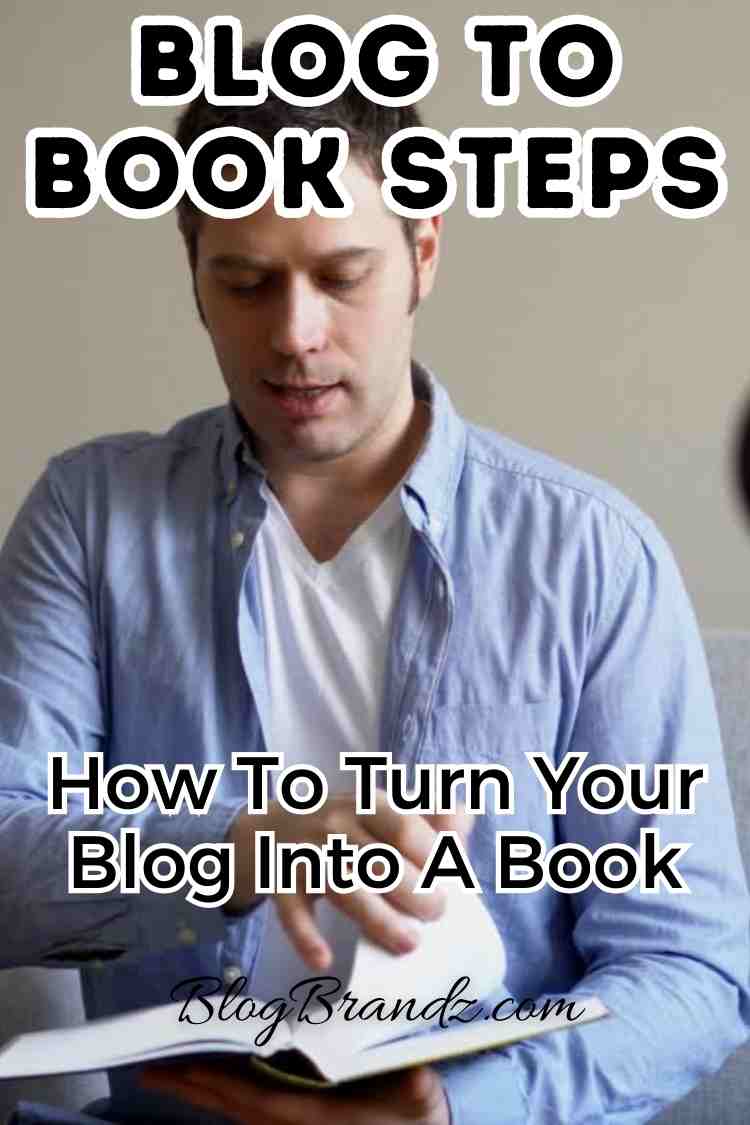
Turning your blog into a book can transform your blog content into a lasting product that builds your personal brand and authority, and generates income.
In the ever-evolving landscape of the digital age, where a single click can transport us to realms of knowledge, entertainment, and inspiration, the blog has emerged as a dynamic vessel of expression.
It’s a canvas where ideas unfurl, stories come to life, and expertise finds its voice. Yet, in this world of fleeting online moments, what if there was a way to immortalize your blog’s wisdom, elevate it beyond the ephemeral scrolls of a screen, and leave an indelible mark on the literary world?
Enter the transformative journey of turning a blog into a book – an endeavor that promises not only the preservation of your digital musings but also the unlocking of doors to an entirely new frontier.
This voyage is not just a chance to repurpose your content; it’s an opportunity to reach a different audience, build a tangible legacy, and establish yourself as an undeniable authority in your chosen field.
In this article, we embark on this exhilarating expedition, delving into the art and science of metamorphosing your blog into a book, and exploring the myriad reasons why you absolutely should.
So, fasten your literary seatbelts, for we’re about to embark on a captivating odyssey that transcends the boundaries of the digital realm and ventures into the world of boundless possibilities.
Turning a blog into a book can be a rewarding endeavor, allowing you to repurpose your content, reach a new audience, and establish yourself as an expert in your field. Here’s a step-by-step guide on how to do it and why you should consider it:
Contents
Why You Should Turn Your Blog into a Book
Turning your blog into a book can help you significantly enhance and build your personal brand in several ways.
#1. Expand Your Audience
Books possess a unique allure that extends far beyond the realm of online readership. They beckon to a diverse audience, beckoning not just to those who frequent the digital corridors of the internet, but also to bibliophiles who savor the tactile pleasure of a printed page or the convenience of an e-reader.
This diversification in readership not only broadens your reach but also ignites the spark of recognition, weaving the threads of your brand into the fabric of a more expansive tapestry.
Moreover, the act of becoming the published author of a book, of seeing your name emblazoned on the spine of a book, injects a potent dose of credibility into your niche, elevating your status from a blogger to a bonafide authority in your chosen field.
Takeaway: Books can reach a broader audience, including those who may not have discovered your blog. While your blog reaches online readers, a book can reach a different audience, including those who prefer print or e-books. This expanded visibility can lead to more recognition, build a stronger personal brand, and help you gain credibility in your niche.
#2. Monetize Existing Content
Transforming your blog into a book isn’t merely a creative endeavor; it’s a strategic pathway to financial empowerment. Unlike the incremental returns from blog ads or affiliate marketing, a well-crafted book can open doors to a more substantial revenue stream.
Imagine your words, meticulously woven into chapters, becoming not just a source of knowledge but also a revenue generator. Should your book ascend to the ranks of bestsellers, the financial rewards can reshape perceptions.
It paints a portrait of success in bold strokes, enhancing your personal brand by casting you as a prosperous and influential professional in your domain. This monetary testament speaks volumes about your expertise and the value you bring to your audience, reinforcing your brand’s authority.
Takeaway: You can sell your book, generating revenue beyond what you might earn from ads or affiliate marketing on your blog. If your book becomes a bestseller and generates income, it can reinforce the idea that you’re a successful professional in your field, contributing to your personal brand’s image.
#3. Preserve Your Content
In the ever-evolving digital landscape, blogs can be remarkably transient. For instance, your blog posts on Instagram, Facebook, Tumblr, Medium, or Quora are subject to the fickle winds of technological change, at risk of obsolescence, or even the unfortunate demise of the website itself.
However, a book stands as a resolute sentinel against the passage of time. It’s a tangible artifact, a testament to your wisdom and insights, destined to endure through generations. In its pages, your knowledge finds a sanctuary, immune to the shifting tides of the online world.
It’s an eternal repository of your expertise, a legacy that transcends the impermanence of the web, ensuring that your valuable contributions remain accessible, revered, and cherished by readers today, tomorrow, and for all time to come.
As an example, Canadian clinical psychologist Jordan Peterson’s interest in writing his bestselling self-help book, 12 Rules for Life: An Antidote to Chaos, grew out of a personal hobby of answering questions with life advice through essays posted on Quora.
Takeaway: A blog might eventually become outdated or go offline, but a book is a tangible, enduring product that preserves your knowledge forever.
#4. Repurpose Your Content
The transformation of your blog into a book is not a one-way street; it’s a gateway to a world of content possibilities. Beyond the confines of your book’s pages, its essence can be distilled into a plethora of formats such as webinars, online courses, and YouTube videos, each serving as a beacon of your brand’s continuity and versatility.
The book’s chapters can spawn blog posts, offering fresh perspectives and in-depth explorations of its themes. Sections can be distilled into articles, each a bite-sized nugget of expertise. Webinars and podcasts can delve into the book’s core ideas, fostering dynamic discussions with your audience.
This multifaceted approach not only reinforces your brand’s consistency but also ensures that your valuable insights resonate across diverse platforms, solidifying your status as a thought leader and amplifying your brand’s impact.
Takeaway: Beyond the book itself, you can repurpose book content for social media content ideas, blog posts, articles, webinars, and more. This reinforces your brand’s consistency and provides valuable content across various platforms.
#5. Create a Long-Term Legacy
In the digital realm, where information rushes by like a river’s current, individual blog posts can feel ephemeral, quickly buried beneath the constant influx of new content. In stark contrast, a book is a literary monument, standing firm against the sands of time.
Its pages harbor your distilled wisdom, offering a timeless reservoir of knowledge. This enduring quality contributes immeasurably to the longevity of your personal brand. As years pass, your book remains a steadfast testament to your expertise, a beacon for those seeking your insights.
It endures not just as a representation of your past accomplishments but as a perpetual source of inspiration, ensuring that your brand’s influence continues to grow and evolve, etching your name indelibly in the annals of your field.
Takeaway: Books have a longer shelf life compared to individual blog posts. They serve as a lasting legacy of your expertise, contributing to the longevity of your brand.
#6. Establish Authority
Becoming the author of a book in your blog’s specialized niche is akin to ascending to the throne of authority in your domain. It’s a proclamation to the world that you are not just a commentator but a luminary in your chosen field.
Your book becomes the ultimate testament to your profound knowledge and expertise, a beacon drawing like-minded individuals, peers, and enthusiasts to your orbit.
As readers immerse themselves in your well-crafted narrative, they are not only educated but inspired, and this transformational impact cements your status as a recognized authority.
This, in turn, opens doors to prestigious speaking engagements, coveted consulting opportunities, and a myriad of other possibilities, all of which further burnish your personal brand’s credibility, positioning you as the unequivocal expert and influencer that you are.
Takeaway: Publishing a book on your blog’s topic can establish you as an authority, leading to speaking engagements, consulting opportunities, and more. It demonstrates your deep knowledge and expertise, and you’re more likely to be perceived as an authority, which boosts your personal brand’s credibility.
#7. Build Trust and Reliability
Becoming a published author bestows a unique aura of trustworthiness and reliability upon your personal brand. In a digital realm rife with information, skepticism, and a multitude of voices, the title of ‘author’ stands as a beacon of authority.
Readers tend to place more trust in individuals who have ventured beyond the realm of anonymity, and who have committed to craft a book, a tangible manifestation of their expertise.
It signifies a willingness to invest time and effort in delivering comprehensive, well-researched, and thoroughly vetted insights. This trust amplifies your brand’s credibility, endowing it with the gravitas and assurance that comes with the recognition of your commitment to knowledge and excellence.
Takeaway: Being a published author adds an extra layer of trustworthiness and reliability to your personal brand. People tend to trust experts and authors more than anonymous bloggers.
#8. Get Media & Speaking Opportunities
Becoming a published author isn’t merely a credential; it’s a key that unlocks a treasure trove of opportunities. With a book under your belt, you become an attractive prospect for media interviews, podcast features, and speaking engagements.
These coveted platforms allow you to amplify your message, reaching wider and more diverse audiences. Each appearance not only elevates your profile but also underscores your expertise, reaffirming your role as a trusted authority.
The ripple effect is profound; as your visibility grows, so does your reputation, leading to a virtuous cycle of recognition and trust. This interconnected web of opportunities fortifies your personal brand, casting it in the golden glow of authority and influence.
Takeaway: Having a book to your name can open doors to media interviews, podcast appearances, and public speaking engagements. These opportunities not only raise your profile but also reinforce your status as an expert in your field.
#9. Leverage Networking
The journey of publishing a book is not just a solitary pursuit but a gateway to a thriving ecosystem of like-minded individuals. Through book-related events, promotions, and collaborative endeavors, you’re bound to cross paths with fellow authors, influencers, and professionals who share your passion and expertise.
These encounters are invaluable, fostering connections that extend your personal brand’s reach and influence. Networking within your niche creates a synergy of ideas, a rich tapestry of shared experiences, and a collective commitment to advancing knowledge.
These connections serve as bridges to new opportunities, enriching your brand’s narrative, and amplifying your impact as you navigate the intricate web of your field.
Takeaway: As you engage in book-related events and promotions, you’ll likely connect with other authors, influencers, and professionals in your niche. Networking can help you expand your personal brand’s reach and influence.
#10. Build Thought Leadership
A book is the canvas upon which your ideas are painted in their full complexity and depth. It provides the space to articulate your unique perspective comprehensively, allowing you to dive into topics, theories, and insights with a level of detail and coherence that surpasses the brevity of blog posts.
This depth positions you as a thought leader within your niche. Readers recognize the dedication and thoughtfulness behind your work, and your ability to articulate nuanced concepts enhances your reputation as a genuine authority.
The book becomes a hallmark of your intellectual prowess, further elevating your personal brand by demonstrating your capacity to shape conversations and inspire new directions within your field.
Takeaway: A book allows you to present your unique perspective and ideas comprehensively. This can position you as a thought leader in your niche, further enhancing your personal brand.
#11. Differentiate Yourself
Amidst the cacophony of voices in the digital realm, the title of a published author serves as a distinctive beacon that pierces through the noise. It’s a powerful differentiator in a sea of competitors, offering a unique selling point that immediately commands attention.
Readers and consumers are naturally drawn to those who have ventured beyond the digital sphere to craft a tangible, enduring work like a book. This differentiation not only helps you stand out but also bolsters your brand identity.
It solidifies your position as an authority, a professional who has transcended the ordinary, enhancing the perceived value of your expertise and contributions. In a crowded landscape, being an author not only sets you apart but also amplifies your brand’s resonance.
Takeaway: In a crowded online space, being a published author of a book sets you apart from competitors and gives you a unique selling point. This differentiation can help you stand out and strengthen your brand identity.
How to Turn Your Blog into a Book
Dive into the realm of transformation as we unveil the captivating steps to metamorphose your blog into an enduring literary masterpiece:
#1. Select Your Blog’s Gems
Delve into your blog’s digital archive as if you’re uncovering hidden artifacts in an archaeological expedition. The process of turning a blog into a book commences with an ardent treasure hunt.
Curate the content that not only showcases your mastery but also resonates with your authentic voice, those that have left an indelible mark on your readers’ minds. These are the precious gems, the narrative keystones that will breathe life into your book.
As you meticulously handpick these invaluable pieces, you’re weaving together the very essence of your expertise, infusing your book with the power to captivate and enlighten, ensuring it becomes a timeless beacon in the literary cosmos.
Takeaway: Start by selecting the blog posts you want to include in your book. Consider a theme or topic for your book and curate relevant content.
#2. Craft a Narrative Arc
Imagine yourself as an architect of words, tasked with designing a literary masterpiece. The arrangement of your selected blog posts is akin to crafting the blueprint of an enchanting narrative. It’s not just about collecting articles; it’s about weaving them together into a tapestry of thought that flows effortlessly.
Your book should be a symphony, where each chapter harmonizes with the next, creating a compelling melody of ideas. It’s not merely a collection of blog entries but a journey for your readers, a story that unfolds, tantalizing their curiosity, and leaving them eager to turn the page.
As you masterfully orchestrate this narrative, you transform disparate pieces into a captivating tale, ensuring your book becomes an immersive experience rather than a mere compilation.
Takeaway: Your book should read like a compelling story, not just a collection of blog entries. Like a skilled architect, arrange your selected posts into a narrative that flows seamlessly. Rearrange the selected blog posts into a logical and coherent structure. Create an outline for your book, with chapters and subsections.
#3. Fill in the Gaps
In the alchemy of transforming a blog into a book, it’s crucial to perceive the narrative gaps as opportunities rather than voids. These are the spaces where fresh insights and connective tissue breathe life into your manuscript, rendering it whole and cohesive.
As you scrutinize your selected blog posts, these gaps are the subtle, yet pivotal, junctures where the reader’s journey can be elevated. By filling them with new ideas, updated perspectives, or even personal anecdotes, you’re not merely patching holes; you’re enriching the tapestry of your narrative.
This meticulous attention to detail ensures your book isn’t a disjointed collection but a symphony of thought, engaging readers with a harmonious flow that keeps them eagerly turning pages.
Takeaway: Your blog posts might need to be expanded upon or revised to fit the book format. Recognize the missing puzzle pieces between your blog posts. These gaps need to be filled with fresh insights and connective tissue to create a cohesive narrative. Add new content to bridge gaps and ensure a smooth flow.
#4. Create New Content
In the process of turning your blog into a book, introducing new content is akin to adding vibrant threads that weave seamlessly through the existing fabric.
These original chapters or sections are the artistic brushstrokes that breathe life into your work, forging connections and enhancing its cohesiveness. They serve as the glue, binding your blog posts together into a harmonious whole.
These new additions provide fresh perspectives, depth, and context, enriching the reader’s experience. They fill gaps, address evolving trends, or explore uncharted territories, ensuring that your book isn’t merely a compilation of past musings but a dynamic, comprehensive, and contemporary exploration of your chosen subject.
You don’t even have to write these new chapters yourself. With the help of AI writer tools, you can kickstart your writing journey by generating a book outline and collaborating with this digital assistant to flesh out each chapter as your ideas flow.
Using AI to write a book is a remarkable fusion of human creativity and machine assistance, allowing you to craft your literary masterpiece with unprecedented ease and efficiency.
Combine Jasper’s cutting-edge AI Author Workflow with the ingenious method pioneered by Darby Rollins to craft a rapid, authority-establishing non-fiction book in a mere seven days, and get on the express track to unlock the secrets of lightning-fast book authorship.
Takeaway: Don’t hesitate to introduce new content. These original chapters or sections are the glue that binds your blog posts into a cohesive book.
#5. Edit and Proofread
In the journey from blog to book, the transformative crucible is the editing process. It’s where the raw ore of your blog posts is meticulously refined into literary gold. With a discerning eye, polish your prose until it gleams with a luminous brilliance.
Every word, every sentence, should be a gem in the reader’s eyes. Refine your arguments, forging them with the strength of a blacksmith’s hammer, ensuring they are unassailable and resplendent. Each paragraph should flow seamlessly into the next like a river finding its natural course.
In this crucible of editing, you elevate your work from mere information to an art form, writing a book that resonates deeply and lingers in the reader’s mind long after the final page is turned.
Takeaway: The transformational process demands meticulous editing. Polish your prose, refine your arguments, and ensure every sentence shines with brilliance. Carefully edit and proofread your content. Consider hiring a professional editor to ensure the quality of your writing.
#6. Design and Formatting
In the world of publishing, aesthetics are the gateway to a reader’s heart and mind. When turning your blog into a book, the visual allure is akin to setting the stage for a grand performance.
The cover is the overture, the first impression that entices a potential reader to reach out and grasp your creation. Engaging a skilled book designer is like having a master conductor orchestrating the visual symphony of your book. They can design an eye-catching cover that beckons readers with an irresistible allure.
The interior layout must be thoughtfully designed, ensuring that every page invites exploration. This meticulous attention to aesthetics is the prelude to an immersive reading experience, where your ideas are not just words on paper, but a visual and intellectual journey that captivates from start to finish.
Takeaway: Design a cover and format the interior of your book. If you’re not proficient in design, consider hiring a professional book designer.
#7. Copyright and Permissions
In the process of transforming your blog into a book, the issue of permissions and attributions is the ethical compass guiding your journey. It’s essential to navigate this terrain with utmost integrity and diligence.
Before weaving third-party content into your narrative, securing the necessary permissions is paramount. This not only safeguards you from legal entanglements but also upholds the principles of intellectual property and respect for fellow creators.
Equally important is the art of attribution; each borrowed gem should bear the rightful mark of its source. This is not just a legal formality but a gesture of gratitude to the contributors who enrich your work.
Ultimately, by honoring these principles, your book emerges as a beacon of ethical scholarship, earning the trust and respect of your readers and peers.
Takeaway: Ensure you have the necessary permissions for any third-party content used in your book, and properly attribute sources.
#8. Publication Path
When embarking on the transformation of your blog into a book, a critical crossroads emerges – the choice between traditional publishing or the path of self-publishing. This decision comes with its own set of challenges and rewards.
Traditional publishing offers the allure of professional guidance, widespread distribution, and the imprimatur of established publishing houses. However, it often demands patience in navigating the rigorous submission process, relinquishing some creative control, and sharing royalties.
On the other hand, self-publishing empowers you with control over every aspect of your book, from content to design. It’s a route that offers more immediate gratification and higher profit margins but necessitates entrepreneurial spirit, keen marketing skills, and a willingness to take risks.
Another option is to create a limited number of copies. These aren’t just any copies; they’re precious editions meant for your personal joy or sharing with your dearest friends and family. It’s like having a secret treasure trove of your online adventures that you can hold in your hands.
But if your dreams are loftier, if you envision your creation gracing the shelves of bookstores or the hallowed halls of libraries, then you should consider getting an ISBN, the International Standard Book Number.
This small but mighty identifier opens doors to the vast world of commercial possibilities. With an ISBN, your book gains recognition, making it a breeze for bookstores and libraries to welcome it into their collections, ensuring that your literary journey finds a home on the grand stage of literature.
The path you choose should align with your goals and resources, but whichever you opt for, remember that each journey culminates in the creation and publication of a book that carries your unique voice, expertise, and passion — an accomplishment worthy of celebration.
Takeaway: Decide whether the traditional publishing route or self-publishing suits your vision better. Each path has its unique challenges and rewards. Self-publishing offers more control but requires more work in terms of distribution and marketing.
#9. Distribution Strategies
Writing a book is just the beginning of your journey; the next crucial step is ensuring it reaches the eager hands of your readers. To do this effectively, you must meticulously map out your book’s distribution strategy.
Will your book find its home on online marketplaces like Amazon, where it can be easily accessed by a global audience? Or do you envision it nestled on the shelves of traditional bookstores, waiting for a curious passerby to discover its wisdom?
Perhaps you’ll take to the stage, using speaking engagements as a launchpad to put your book directly into the hands of your target audience.
Tailoring your distribution strategy to align with your vision ensures your book’s transformative message can reach its intended recipients, making every word you’ve penned a beacon of enlightenment and inspiration in the lives of your readers.
Takeaway: Map out your book’s journey to readers’ hands. Will it be available online, in bookstores, or through speaking engagements? Tailor your distribution strategy accordingly. If you self-publish, choose where and how you’ll distribute your book. Platforms like Amazon Kindle Direct Publishing (KDP) and IngramSpark are popular options.
#10. Promotional Blitz
The launch of your book isn’t just a mere event; it’s the grand unveiling of your literary masterpiece, a celebration of your dedication and creativity. To make this moment truly unforgettable, infuse it with flair and enthusiasm.
Plan a book launch to generate excitement and sales. Organize book launch events, inviting friends, family, and followers to partake in the revelry. Collaborate with influencers and experts in your niche who can lend their credibility to your work, expanding your reach.
Leverage the formidable power of social media to create a crescendo of excitement, teasing your audience with snippets and behind-the-scenes glimpses. Consider doing book signings, interviews, or guest blog posts on influential book blogs to increase visibility.
This symphony of efforts ensures that your book doesn’t just arrive; it makes a grand entrance, leaving an indelible mark in the literary world and etching your name into the hearts and minds of your readers.
Takeaway: Launch your book with flair. Organize events, collaborate with influencers, and utilize the power of social media to create buzz. Promote your book through your blog, social media, email newsletters, and other marketing channels. Leverage your existing blog audience to make your book a bestseller.
#11. Engage with Readers
The release of your book isn’t the final chapter; it’s the beginning of an ongoing dialogue with your readers. Once your literary creation is in their hands, don’t fade into obscurity.
Engage actively and authentically with your audience. Encourage them to share their thoughts through reviews and feedback, and be responsive to their comments. This engagement goes beyond the book; it’s about fostering a vibrant community around your work.
By doing so, you not only cultivate a loyal following but also gain invaluable insights, building a bridge between your readers and the essence of your brand. It transforms your book from a static creation into a dynamic, evolving conversation that keeps readers coming back for more.
Takeaway: Don’t just release your book and vanish. Engage with your readers, encourage reviews, and build a community around your work. Encourage readers to leave reviews and feedback, and engage with them to build a community around your book.
#12. Iterate and Elevate
Indeed, the culmination of your blog-to-book journey is not a conclusion but rather a prologue to an ongoing narrative. After publication, your book takes on a life of its own, engaging with readers, sparking conversations, and eliciting feedback.
Embrace this feedback as a compass, guiding you through the evolution of your work. Assess how your book is performing in the real world – what resonates with readers, what needs fine-tuning, and what can be expanded upon.
Be prepared to release updated editions, ensuring your message remains relevant in an ever-changing landscape. This dynamic approach not only keeps your book fresh but also reinforces your commitment to delivering enduring value to your audience, cementing your position as an influential figure in your niche.
Takeaway: Your blog-to-book journey doesn’t end with publication. Listen to feedback, assess your book’s performance, and be ready to release updated editions to keep your message relevant. Use reader feedback to improve your book and consider expanding it with new content in updated editions.
Blog to Book Tools & Courses
Turn blogs into books with ease with these blog-to-book courses and tools that will help you create a book from blogs.
#1. Blog Your Book in 30 Days Course
Unlock the secrets to becoming a published author in the “Blog Your Book in 30 Days Course.” This transformative journey will guide you through crafting, publishing, and elevating your brand by blogging your non-fiction book within a mere 30 days.
No matter if your book is already written or you’re starting from a blank slate, you’ll master the art of blogging your book. Discover the power of a dynamic 30-day blogging plan that you can employ time and time again. Craft a book outline that becomes your roadmap for captivating content.
Immerse yourself in this blog-to-book course and watch your ideas evolve into a compelling first draft as you blog your way to authorship in just 30 days. You’ll also learn how to harness the incredible power of ChatGPT to assist you in planning, writing, and refining your book.
#2. Designrr’s Blog-To-Book Tools
Designrr is a tool that helps you import content from any source to create ebooks from multiple sources. Whether you want to turn your blog on WordPress to books or use your content on Squarespace, Shopify, or Hubspot, all you need is the URL of the actual post.
Designrr also provides unlimited styling possibilities so you’re not forced into any structure or template. It covers all publishing formats such as PDF, ePub, Mobi (Kindle), and HTML.
Automatically transcribe from YouTube, podcasts, video, and audio files and publish them into an ebook or audiobook. You can turn your webinars, lectures, speeches, coaching calls, or video training courses into ebooks and use them as professional lead magnets with Designrr.
How to Make a Book from Tumblr Blogs
Turning your Tumblr blog into a book is a creative project that you can easily accomplish with Designrr’s blog-to-book tools. Before proceeding, create a backup of your Tumblr blog in case anything goes wrong or you want to revisit your original content. You can use Tumblr’s export feature to do this.
Alternatively, you can turn your Tumblr into a book by copying the text and images from your selected Tumblr posts. You can add extra content, such as an introduction, personal reflections, or commentary between posts to provide context or insights.
If your Tumblr blog contains content created by others or if you’ve reblogged content, ensure you have the necessary permissions or licenses to include that content in your book. Ensure that you comply with copyright laws and intellectual property rights throughout the publishing process.
If your Tumblr posts include images or illustrations, make sure they’re of high quality and properly integrated into your book’s design. Credit the creators of any images that you didn’t create yourself if you’re planning to publish the book.
Turning your Tumblr blog into a book can be a rewarding project, allowing you to preserve your online content in a tangible format. You can also use the tips above to turn your Facebook posts into books or convert a blog on Medium or WordPress into books.
How to Turn an Affiliate Blog Into a Book
Turning an affiliate blog into a book allows you to repurpose your existing content, extend your expertise to a broader audience, and potentially generate additional income.
The steps to transform your affiliate marketing blog into a book are very similar to the ones above with a few slight modifications and stipulations.
Review your blog posts and select the most valuable and relevant content based on the overarching theme or topic of your book to ensure the selected content aligns with it.
Expand on your affiliate blog’s content to provide more in-depth information, insights, and analysis. A book should offer readers a more comprehensive understanding of the subject matter than a series of blog posts.
Create a detailed outline for your book to serve as a roadmap for your writing. Ensure that the chapters flow smoothly and maintain a consistent writing style throughout. Ensure that you have the necessary permissions and rights to use your affiliate blog content in a book format.
Pro tip: Never make the mistake of using naked affiliate links in an eBook that you’re publishing on various bookseller sites. If you’re converting a blog on WordPress to a book, consider using the ThirstyAffiliates affiliate link cloaking plugin for WordPress to create permanent links in the backend.
This way, should the affiliate program close down or move to another affiliate marketing service, you will be able to update any affiliate links from your blog’s backend and ensure they remain live or redirect them to a live page on your blog.
Conclusion
Embarking on the odyssey of transforming your blog into a book demands time and effort, yet the rewards gleam like hidden treasures in the depths of this literary adventure. Picture this: your personal brand ascending to new heights, a revenue stream flowing like a river, and your content reborn in a fresh guise, more valuable than ever.
While the path may be long and winding, the destination promises to be a realm of unmatched opportunities. It’s a journey that transforms the ordinary into the extraordinary, where your words become the currency of influence, and your wisdom shapes a legacy that defies the passage of time.
To unlock the full potential of transforming your blog into a compelling book for supercharging your personal brand, you must harmonize your book’s essence with your blog’s core message and niche. This fusion creates a symphony of consistency that resonates with your audience.
But don’t stop there. You must wield the megaphone of promotion across a multitude of platforms, painting the town with your literary masterpiece. Engage with your readers, forging connections that transform casual fans into devoted advocates.
And while the spotlight shines on your book, never forget your digital roots. Continue cultivating your blog with a steady stream of top-tier content, ensuring your brand remains a powerful and ever-evolving presence in the minds of your audience.
As you embark on the journey from blog to book, remember that it’s more than a simple conversion. It’s a transformation, a rebirth of your content, and an elevation of your personal brand. Buckle up, for you’re about to craft a literary legacy that will resonate with readers for generations to come.
Also see:
- Blogging articles, blogging tips & tutorials
- Book writing and marketing tips & tutorials
- Personal branding tips & tutorials
© 2023, Priya Florence Shah. All rights reserved.
Priya Florence Shah is a bestselling author and an award-winning blogger. Check out her book on emotional self-care for women. Priya writes short stories and poetry and chills with her two-legged and four-legged kids in her spare time.
Discover more from Business & Branding Tips
Subscribe to get the latest posts sent to your email.


















